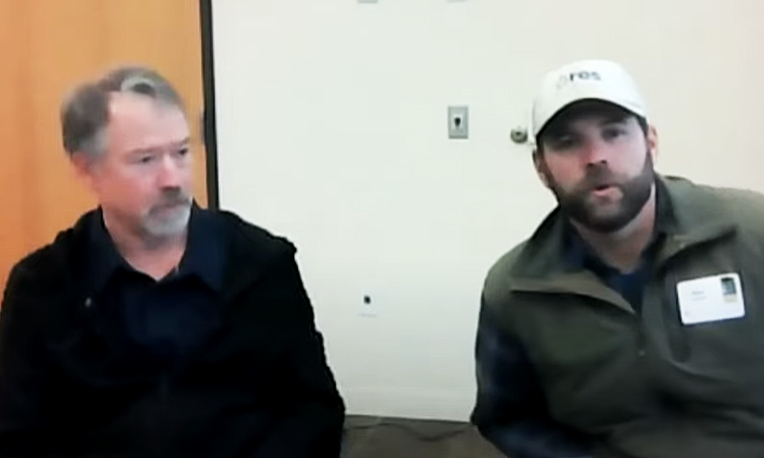|
https://www.youtube.com/watch?v=cFJdk4Q5dbE
Panel Discussion on Klamath Dam Removal Science
and Monitoring
Video recorded 11/16/22
 Left:
Tommy Williams, NOAA, Right:
RES/Resource Environmental Solutions geologist Dave Coffman Left:
Tommy Williams, NOAA, Right:
RES/Resource Environmental Solutions geologist Dave Coffman
Here are a few quotes with some of the ecoterrorist
government agencies’ lies about the “benefits” of Klamath Dam
destruction experiment, and horrific truths, and lack of
information of what the outcome will be, by USGS, NOAA, Yurok
Tribe, RES. Listen closely to this 1 1/4 - hour video.
“…there is a glutton of money out there to do some really cool
stuff…” says Tommy, NOAA Fisheries, regarding “restoration” from
the destruction of Klamath River Dams, communities, ecosystems,
water quality, species, hatchery, Upper Basin irrigation water.
Mike Belchik, senior fish biologist for Yurok Tribe:
“Now Keno dam is managed for water level only…to keep
infrastructure working for the agricultural program…that’s no
longer going to be the case. Keno is going to have to be managed
for steadyish flow as the water level’s gunna be maintained.
..The day to day flows for lake levels or deliveries to
agriculture…that has not been set…the Bureau of Reclamation
…doesn’t have any of those plans…”
Here are a few quotes with some of the ecoterrorist
government agencies’ lies about the “benefits” of Klamath Dam
destruction experiment, and horrific truths, and lack of
information of what the outcome will be, by USGS, NOAA, Yurok
Tribe, RES. Listen closely to this 1 1/4 - hour video:
The plan is to plant salmon and lamprey (fish parasite)
in warm Klamath Lake to “restore” Klamath River “ water quality.
RES/Resource Environmental Solutions geologist Dave
Coffman: “…ultimate goal of achieving water quality…” (by
destroying dams which will release 20 million cubic yards of
sediment throughout the entire watershed, and destroying the
dams’ deep cold water lakes will result in pouring downriver
warm Klamath Lake that historically was too mineral laden for
horses to drink.) “…we’re very excited …about what’s going to
happen and the opportunities for data collection to see what
truly happens when dams are removed…”
”We haven’t analyzed collections we have been collecting and
tribes. Hoping we can make priority to assess data we’ve
already collected.”
“USGS – “…hoping we’ll get some sediment flux
estimates out…”
“We really don’t understand what the potential for
environmental flows are under optimized conditions…Is there more
environmental flow? We need to be thinking about flow for this
restored river…that may be a missing piece of our thinking from
the Upper Basin.”
There are several reefs and falls under the dam reservoirs,
one under Copco Lake more than 30’ tall. Coffman answered a
question: “is there an effort to identify geographic features
altered during dam destruction and possible restoration.” “Not
right now there’s not. It’s more a wait and see what comes
after and during dam removal…we talked about lava dams and
reefs, falls and all these different things…”
A question was asked: There are other reefs; are you going to
blow them since they impede the fish? So you’re going to take
out the dams but the fish can’t go up?
Tommy Williams, NOAA: “…there’s no plan to blast
everything that we perceive as a barrier. My profession did that
all over the landscape starting in the 60’s and 70’s…we’ve done
that experiment and it did work!
Belchik, “…things that become exposed as the
reservoirs are down will be handled…on a case by case basis.”
Belchik: “Now Keno dam is managed for water level
only…to keep infrastructure working for the agricultural
program…that’s no longer going to be the case. Keno is going to
have to be managed for steadyish flow as the water level’s gunna
be maintained. ..The day to day flows for lake levels or
deliveries to agriculture…that has not been set…the Bureau of
Reclamation …doesn’t have any of those plans…”
Coffman, “There are a number of other projects in the
country…that are waiting to see how Klamath works out before the
next steps are taken on those…”
Coffman, “I’ve spent the majority of my career
adapting for applied practice of scientific data collection to
build a case for the benefits of restoration…”
Coffman, “…while there is a glutton of money out
there to do some really cool stuff…in the basin in
particular, …If we can focus our efforts on…justification…on
practical application of removing dams as benefits for
results, outcomes, with a mind to the human environment and the
underlying ecosystem responses…I think well get to see more
related projects coming up very quickly.”
Williams: We need to get coordination on how to
monitor fish in the Upper and Lower basins, tags moving across
the landscape which we’ve never had before, how do we manage our
data bases, how do we count salmon in the upper basin…
? What happens if next five winters are very wet?”
Coffman: “We’re going around the clock to make sure this
thing happens on the timeframe it’s been committed to.”
https://www.youtube.com/watch?v=cFJdk4Q5dbE
====================================================
In accordance with Title 17 U.S.C.
section 107, any copyrighted material
herein is distributed without profit or
payment to those who have expressed a
prior interest in receiving this
information for non-profit research and
educational purposes only. For more
information go to:
http://www.law.cornell.edu/uscode/17/107.shtml |

